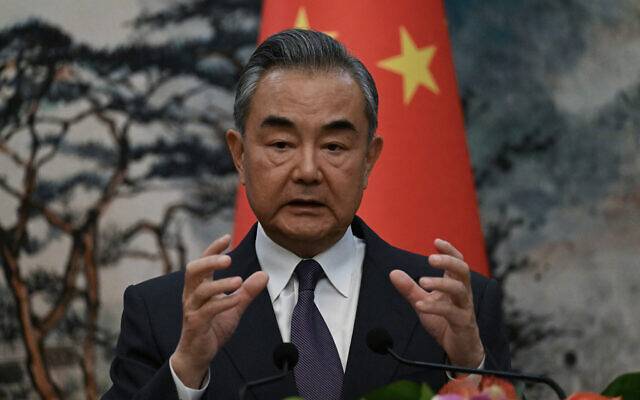
Chinese Foreign Minister Wang Yi attends a high-level EU-China strategic dialogue at the Diaoyutai State Guesthouse in Beijing on Oct. 13. (Credit: Pedro Pardo/AFP)
US President Joe Biden visited Israel on Wednesday, demonstrating Washington’s unequivocal support for Tel Aviv in its war with Hamas.
Meanwhile, China, another global heavyweight, is taking a more cautious approach vis-a-vis both sides. Using its growing influence in the Middle East, Beijing intends to play the role of peacemaker to avoid a regional explosion.
Calling for an immediate ceasefire, while simply urging both sides to “remain calm,” China’s apparent neutrality does little to disguise its increasingly assertive support for the Palestinian side, a cause it has championed since the days of Mao Zedong.
Since the start of the war this month, China’s state media have been harsh on Israel, while the authorities have been reluctant to condemn the actions of Hamas, angering Tel Aviv, which sees Beijing’s official reaction as an inappropriate response that “does not recognize the national right to self-defense.”
China may well be seeking to maintain good relations with the Arab states — Beijing now trades more than the US with most countries in the region — and occupy a leading role in the Middle East. This is a strategy that has brought it considerable diplomatic success, notably its mediation in the normalization agreements between Saudi Arabia and Iran, signed in the Chinese capital last April.
Gedaliah Afterman, former diplomat at the Australian Embassy in Beijing in charge of China’s foreign policy, answers L'Orient-Le Jour’s questions:
What can we say about China’s position in this conflict, at a time when the US seems to be getting increasingly involved in it?
China’s initial reaction was in line with its traditional cautious approach to balancing the various players in the Middle East. Israel criticized China’s refusal to condemn the Hamas attack. In recent days, we have seen Beijing adopt a more pro-Palestinian stance, criticizing Israel’s response and calling for a ceasefire.
It’s important to note that China’s involvement in the Israeli-Palestinian conflict is not primarily about Israel or the Palestinians. Rather, it must be understood in the context of China’s broader regional commitments, notably in the Gulf and the Arab world, as well as its rivalry with the United States on the world stage.
From Beijing’s point of view, despite Israeli criticism, such a stance gives it credit in the Arab world, flexibility in its response, and could potentially position China as a mediator, at least rhetorically, mirroring the role it played in the recent rapprochement between Saudi Arabia and Iran in March, for which it received much praise.
However, unlike in the past, when expectations of China’s potential role were low, Beijing’s inaction now that expectations are higher could damage its regional image, particularly in relation to the US.
What role does China hope to play by siding with the Arab countries in its increasingly assertive support for the Palestinian side, when it had previously intended to act as a mediator in the conflict?
Regional stability in the Middle East is of major interest to China, not least because of the region’s growing strategic importance to Beijing over the past decade. Unlike the US, China hopes to be seen as an “honest broker” in the region. Yet, despite presenting itself as an emerging regional power, it has so far been rather passive in the current conflict. While it is unrealistic to expect China to play a significant role in resolving the Israeli-Palestinian conflict itself, it could have a role to play on specific issues, including mediation on humanitarian matters, such as negotiating the release of civilian hostages and humanitarian corridors for civilians in Gaza.
Could Beijing take advantage of this sequence to strengthen its position vis-à-vis the United States in the region, in particular by putting the brakes on the anti-Iran alliance sought by Washington and Tel Aviv?
With President Biden’s decision to deploy the Ford aircraft carrier and other [military] capabilities in the region, the US is sending a clear message: it remains very present in the Middle East. This message is clearly heard from Riyadh to Cairo: we can count on a guarantee of American security. This poses a potential problem for China, which has banked on the perception that the US is withdrawing from the region. Beijing, for its part, is clearly limited in its ability to use force projection and military support in the Middle East, particularly in relation to the United States. This conflict is not limited to Israel and the Palestinians but has the potential to engulf the region.
While China does not want a US-led anti-Iran alliance, it also values its relations with Saudi Arabia and the United Arab Emirates. These would suffer if China were perceived as excessively supportive of Teheran and Hamas.
With all this in mind, China could demonstrate its leadership and mediation skills in a more substantive and less controversial way, a move the US cannot make. Building on its success in mediating between Saudi Arabia and Iran, it could facilitate negotiations for the release of civilian hostages held by Hamas in Gaza and contribute to agreements on humanitarian corridors. Such success would not only ease regional tensions, but also consolidate China’s reputation as a key player in de-escalation and the maintenance of regional stability.
This interview was originally published in French in L'Orient-Le Jour. Translation by Sahar Ghoussoub.